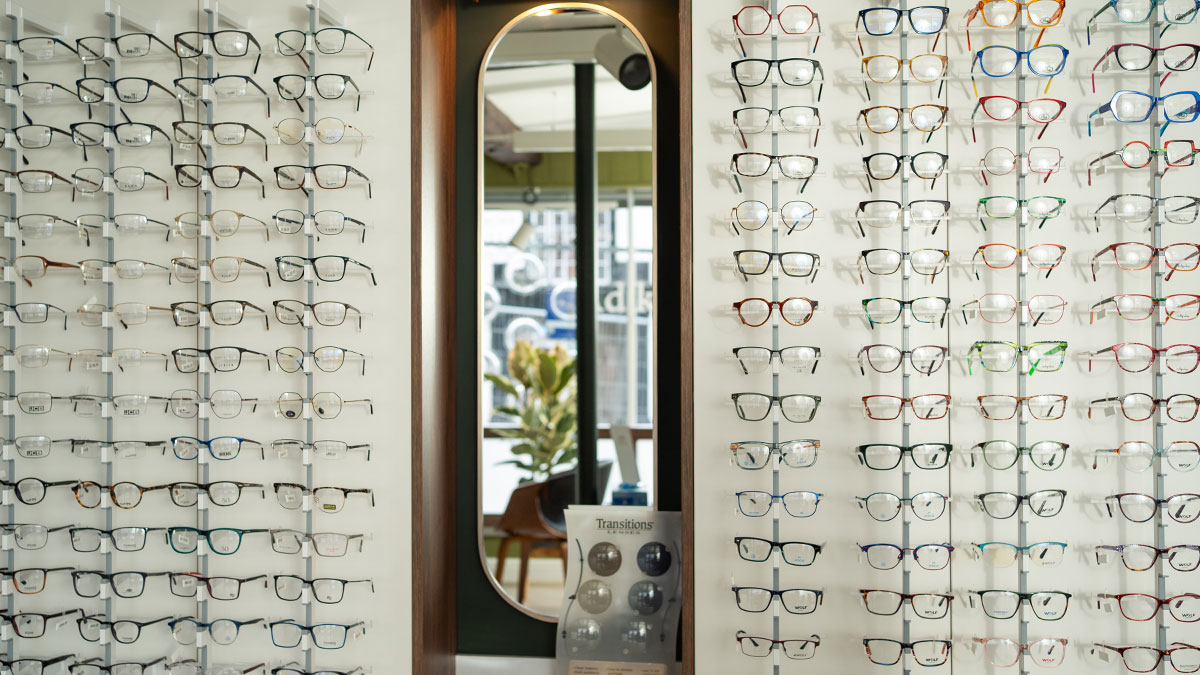The type of lenses you choose are critical to your quality of vision.
The type of lenses you choose are critical to your quality of vision. This page will give you a good idea of the different options available to you.
Broadly speaking, there are 3 main types of lenses:
Single vision lenses will incorporate one prescription only. They are commonly used to for distance, intermediate (VDU) and reading glasses.
Advantages – cheapest lens type and no distortions.
Disadvantages – those with more than one prescription may need a different pair for each task, which may be inconvenient.
Bifocals can be likened to two lenses formed together, with a discrete dividing line. Most commonly, these are used to correct distance with a reading segment, but are sometimes used to correct VDU and reading simultaneously.
Advantages – a cost effective way of combining 2 prescriptions, excellent clarity with no distortions and a large reading area.
Disadvantages – some patients are conscious of the dividing line, make the floor blurred requiring care with walking around and limited focal range can result in poor intermediate vision.
Varifocals are the most complex lens type and gradually blend from a distance prescription at the top, through to the reading prescription at the bottom. This means that they have the best depth of focus and will allow you to see all distances between distance and near, by looking through the correct part of the lens. Probably the nearest patients can get to the vision they had before reading problems started.
Advantages – cosmetically indistinguishable from single vision, and excellent depth of focus.
Disadvantages- the choice of varifocal lens design and the fitting can be critical to achieving the best visual performance. Some varifocals have a larger reading area, smoother change of focus and less distortion than others. Therefore, even if you like the idea of varifocals and have tried them unsuccessfully in the past, you may find that you have more success with the more modern designs.
Whilst most lenses dispensed are plastic (Plastic lenses have the advantage of being lighter and more shatter resistant than glass. To make them more scratch resistant, all our plastic lenses automatically come with a hard coat), polycarbonate (thinner, lighter and more shatter/chip resistant than standard plastic lenses) and glass (more scratch resistant but heavier and more prone to shatter/chip) are still useful options. Plastic and glass lenses are available in a range of refractive indexes, allowing for a choice in lens thickness.
Normally light is focussed by the cornea and the lens to form a sharp image on the Retina. Sometimes the eye ball is too long and the light comes to a focus before the retina. Lenses to correct this are thicker at the edges than in the middle. In a stong prescription, the edges can be particularly thick and unsightly.
There are a number of ways to avoid this:
Normally light is focussed on the retina at the back of the eye to form a sharp image. Long-sightedness means the eye is too short and the light is focussed beyond the retina.
Lenses to correct this are thicker in the middle than at the edges. In a strong prescription, the lenses can be particularly heavy and unsightly. There are various ways to improve the appearance and minimise the weight of the lenses.
Choosing a small frame will help minimise the weight.
Secondly, consider lenses with a higher “refractive index”. This will also reduce the thickness and weight of the lenses.
Choosing lenses with an aspheric design will reduce the thickness further still. Anti-reflection coatings can also improve the appearance and your vision through them.
Reflections from lenses make them more noticeable.
Internal refractions within the lens can result in distracting reflections and “ghosting”.
These are particularly noticeable in bright sunshine or driving at night.
Also, bright objects behind you can be reflected back into your eye creating a distracting double image.
These reflections can be reduced by applying a special anti-reflection coating to the lens.
This not only makes the lenses look more transparent but also helps to get rid of distracting reflections.
It can also be beneficial when driving, particularly at night.
There are several different options for tinting lenses:
Fixed tint lenses are as the name suggests, permanently set at a particular tint, which can be as dark or light as required and virtually any colour.
Photochromic lenses automatically adjust according to the brightness of the light, changing from almost clear to a full sunglass tint in the sun.
This provides comfortable vision under all conditions and excellent protection from UV.
Polarised lenses not only reduce glare like normal sunglasses, they also have the special property of cutting out reflections from shiny surfaces.
They are ideal if you like spending time near water.
They are also great for driving …
… reducing reflection from the bonnet and dashboard …
… and wet roads.
The polarised lens is sandwiched between two layers of material …
… and the lens made to prescription.
We can demonstrate all these options both physically and using our Optikam dispensing system. Our experienced dispensing staff are always on hand to advise you on all the options suitable for your visual needs, in a relaxed and caring environment.
Being independent, we can select the products we offer on merit. Therefore, exclusive to the area, we recommend and supply Optik Mizen Lenses, since we find their quality and service unsurpassed. We can of course obtain most other brands of lenses if required.


or if you have any questions please contact us by filling the from below or give us a call on 01379 650899